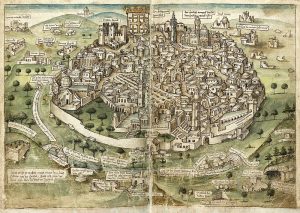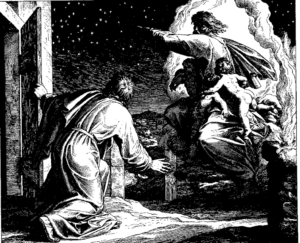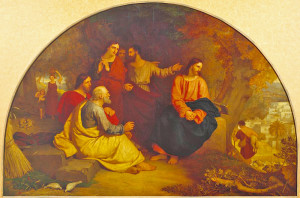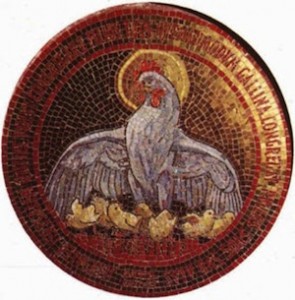Thoughts on Sunday’s Lessons for March 13, 2022 (Lent 2C)
First Reading: Genesis 15:1-12, 17-18
Sunday’s Lectionary readings celebrate our hope in God, even in times of darkness. Last Sunday’s first reading from Deuteronomy about God’s covenant with the chosen people was easy to understand:

View of Jerusalem (1487), bookplate by Konrad Grünenberg (c.1415-1494), author and artist from Konstanz, Germany. (Click image to enlarge.)
Give thanks to God with the first fruits of the harvest, not just what’s left over after the feast. Be good to our neighbors and to the poor. The covenant with Abram from Genesis is a little harder to engage with modern ways of thinking, with its talk about sacrificing livestock and poultry to please the Holy One. Looking past the temple traditions of the Bronze Age in the ancient Near East, though, we see what endures: God’s promise stays with us always, even when the darkness seems deep and terrifying.
Psalm: Psalm 27
As we chant this Psalm, try to hear its pattern of trust, hope and petition. First it simply declares our trust in God, our light and salvation, whose strength is so great that nothing can stand against it to make us afraid. But then it takes a darker turn as we hear an earthly king – King David, according to tradition – imagining frightening possibilities, from flesh-eating evildoers to camps full of enemy warriors. Yes, terrible things might threaten us, but the Psalm carries on, trusting God, calling on God to have mercy and keep us safe. Even when we feel under attack, beset with dangers and real-life fears, we can place our confidence in God and ask for God’s protection.
Second Reading: Philippians 3:17-4:1
The people of the church in Philippi in northern Greece had endured much in order to embrace the Christian way. Like the people in Psalm 27, they worried about earthly fears and persecution by their enemies. But Paul reassures them with pastoral advice that might recall the Psalmist’s wisdom: Look to God, through Christ, for our salvation. Stand firm in our faith and find meaning in our lives by making every effort to live as Christ would have us live.
Gospel: Luke 13:31-35
Since the end of the ninth chapter of Luke’s Gospel, Jesus and his followers have been on a long journey from Galilee to Jerusalem, teaching and healing and arguing with opponents along the way. Now as they draw closer to their destination, some friendly Pharisees warn Jesus that King Herod wants to kill him. Jesus won’t alter his chosen course, though, even if it will lead to death in Jerusalem (which he calls the “city that kills the prophets”). His journey may threaten his life, yet he speaks of his love for the city in a nurturing, motherly image of a hen and her chicks.



